Sep 8, 2024 – Oceania Dharma Q&A Tour (4) for Korean expatriates in Melbourne
Hello. Today is the fourth day of the Oceania Dharma Q&A tour, where Sunim will be giving a Dharma Q&A for Korean expatriates in Melbourne.
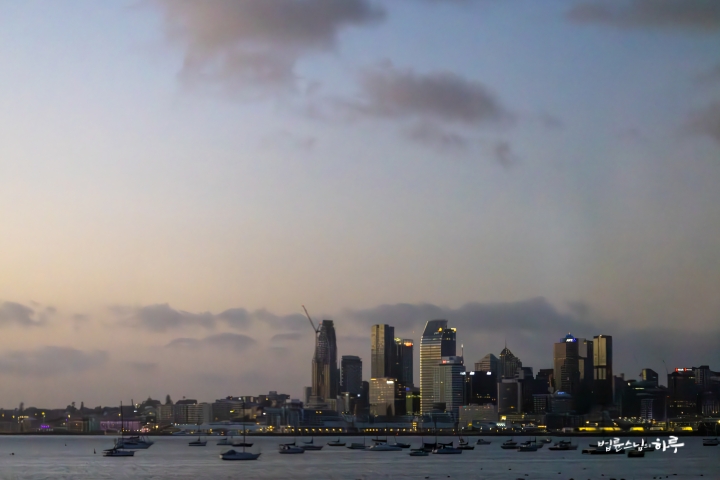
After completing his morning practice and meditation, Sunim had breakfast at the accommodation at 5:30 AM and headed to Auckland Airport at 6:00 AM.
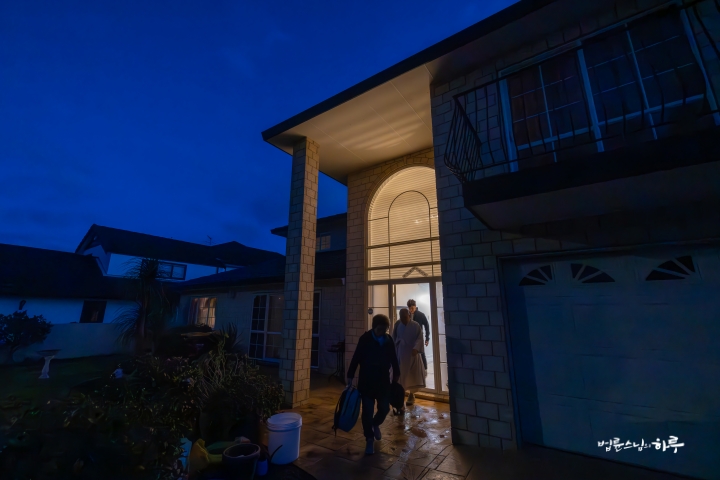
During the drive to the airport, the morning sun rose outside the car window.
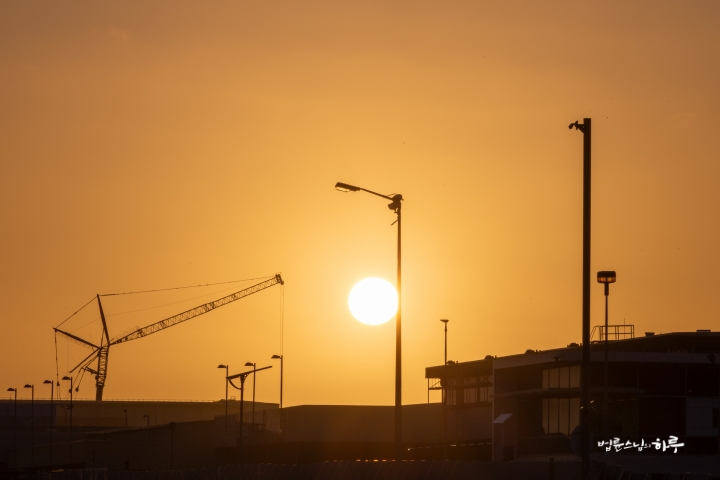
Upon arriving at Auckland Airport, Sunim said goodbye to the members of Jungto Society New Zealand.
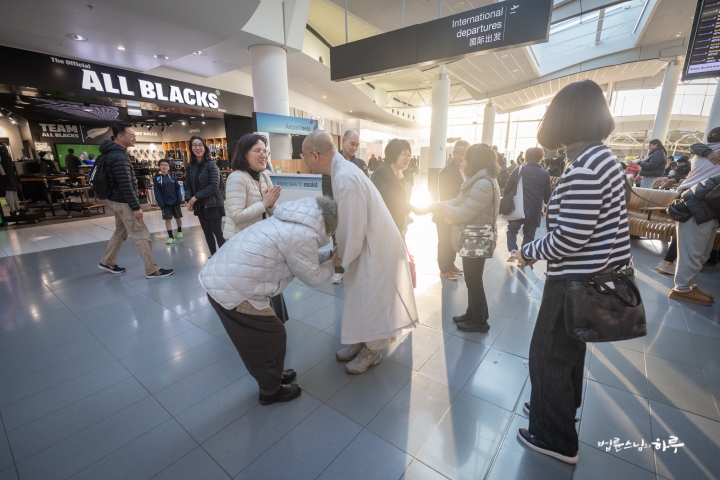
“I had a good stay. Thank you.”
After expressing his gratitude and taking a group photo, Sunim headed to the boarding gate to catch his flight.
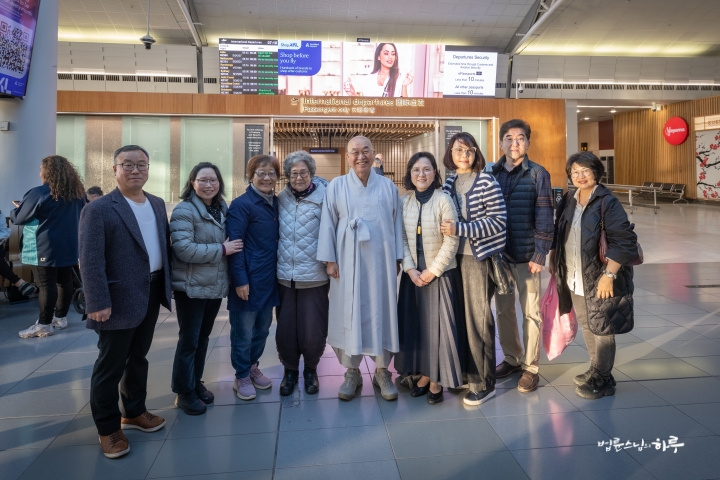
The flight, originally scheduled to depart at 8:50 AM, was delayed by 40 minutes and left Auckland Airport, New Zealand at 9:30 AM.

After a 4-hour flight, Sunim arrived at Melbourne Airport, Australia at 11:30 AM local time. After retrieving his luggage and completing immigration procedures, he was greeted outside the airport by Mr. and Mrs. Kim Seung-ju and Choi Young-hee, members of Melbourne Jungto Society, who presented him with a bouquet of flowers.
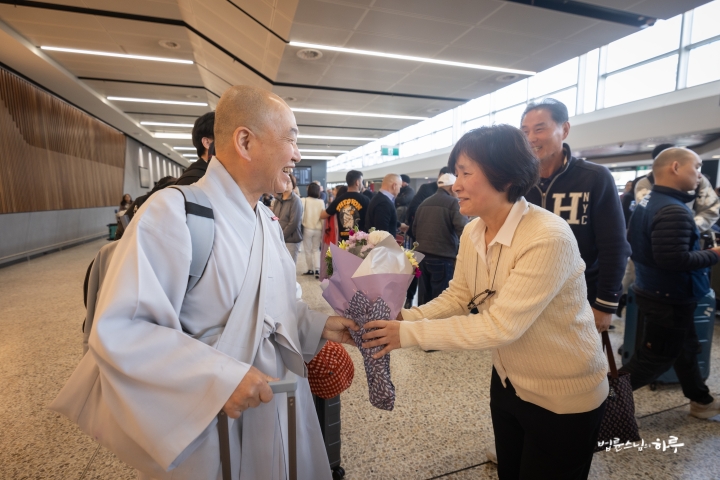
“Welcome to Melbourne.”
After exchanging warm greetings and taking commemorative photos, they immediately headed to the accommodation.
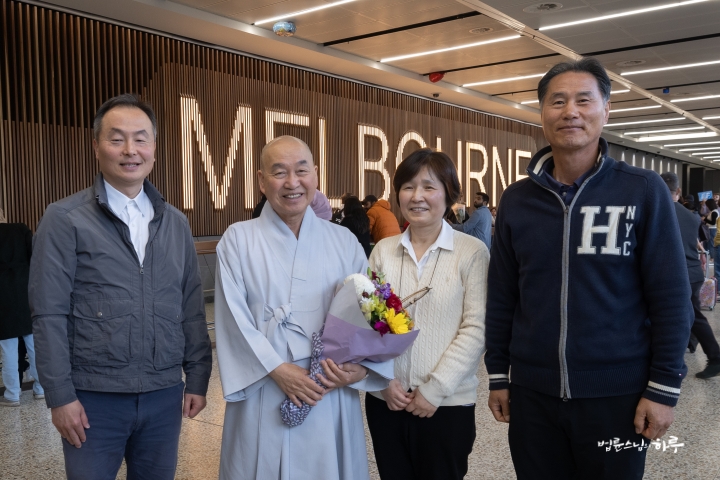

After having lunch and taking a rest, Sunim moved to the lecture hall at 5 PM. From the afternoon, it suddenly started raining heavily in Melbourne.

Today’s lecture is being held at the Box Hill Town Hall building. This landmark municipal building in Box Hill, which usually hosts various art exhibitions, is today hosting a Dharma Q&A for citizens.
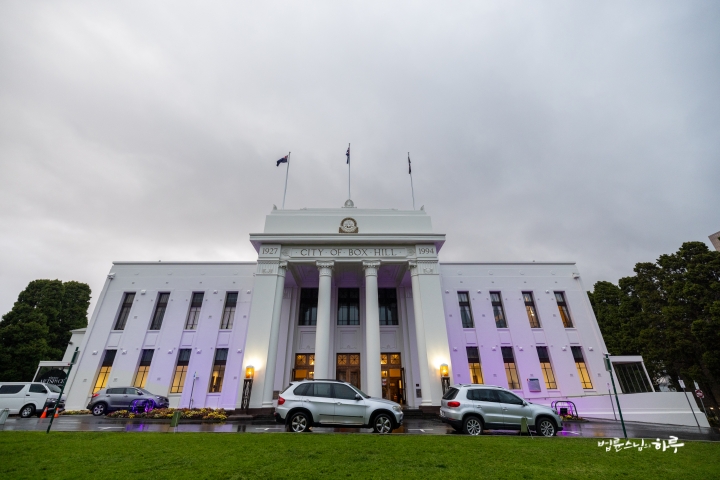
Upon arriving at the lecture hall, volunteers were warmly welcoming the audience from various corners.
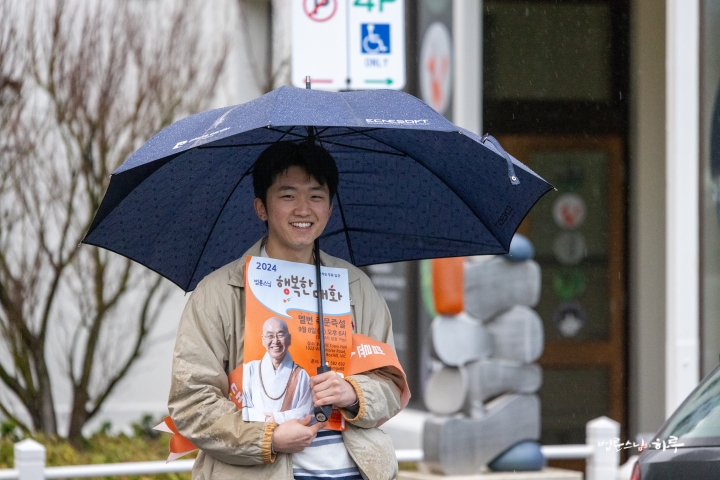
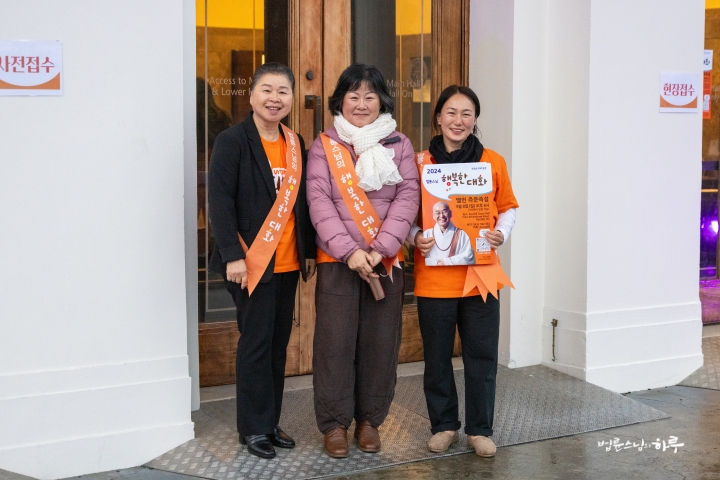
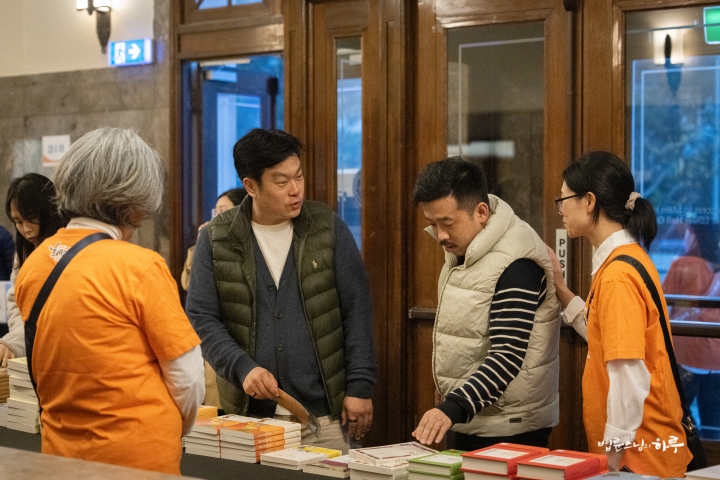
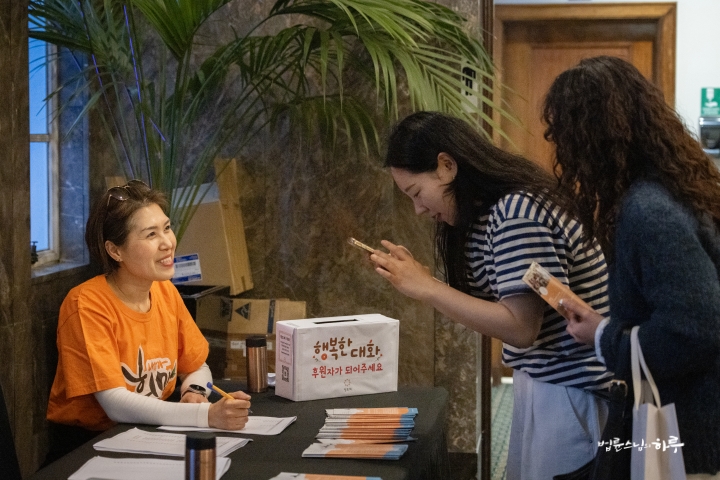
As 6 PM approached, the 300 seats prepared in the main hall were filled without any empty spaces. When Sunim took the stage, a long applause followed.
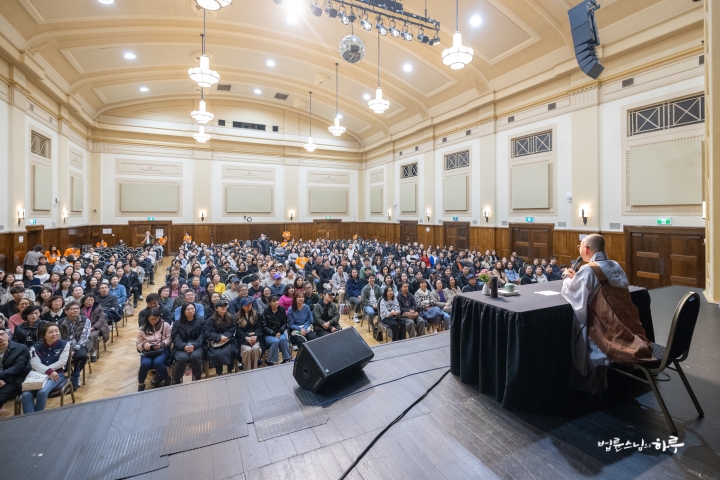
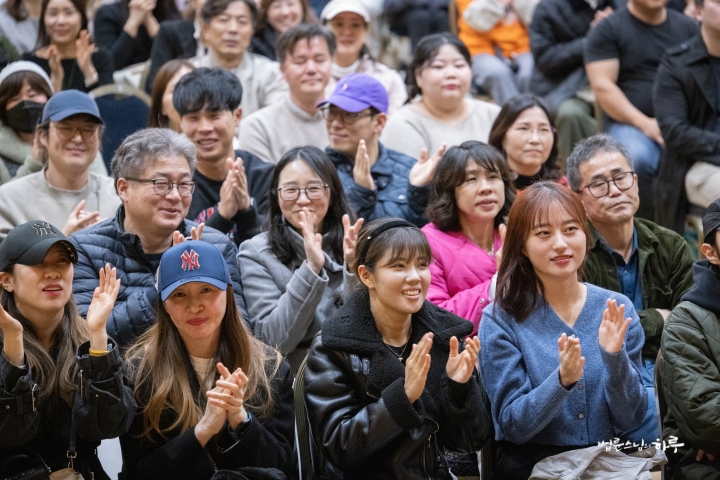
Sunim first introduced the method and purpose of Dharma Q&A.
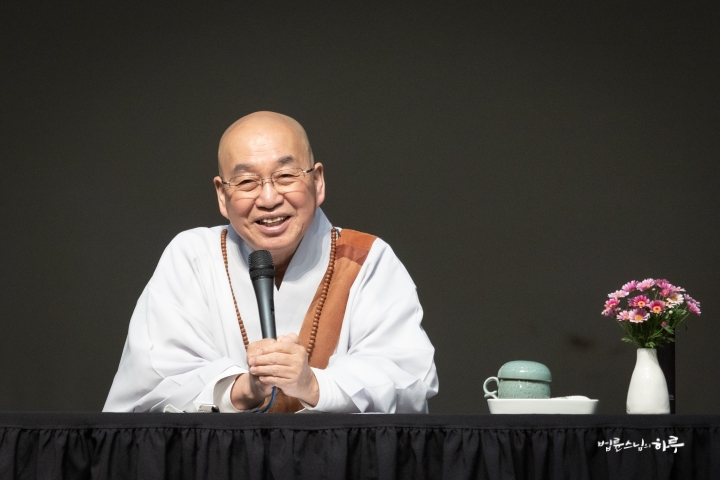
“Dharma Q&A is not a formal question-and-answer session where questions are prepared in advance and specific answers are given. It’s more like a conversation between friends over a cup of tea. When one friend shares a concern, saying ‘Friend, I have this problem,’ there may not be a specific answer, but through the conversation, the person’s doubts, stress, or suffering can be somewhat resolved. That’s what we call Dharma Q&A. Therefore, there’s no set topic for the conversation. Many people often mistakenly refer to it as ‘immediate question and answer’ or ask, ‘How do you give such precise answers, Sunim?’ This shows a complete misunderstanding of the purpose of Dharma Q&A. It’s simply a conversation. In the past, a conversation that helped unravel one’s problems to some extent was called ‘words of wisdom.’ That’s why we use the character ‘說’ (seol), meaning ‘to speak,’ in the term ‘Dharma Q&A’ (즉문즉설, jeukmun jeukseol).”
Your Current Suffering Is the Topic of Conversation
“You can ask about knowledge-based topics, but I don’t think we need to include such topics in our conversation, especially given our limited time. In the past, when encyclopedias were hard to come by, it was necessary to ask experts in specific fields. Nowadays, you can easily find information on the internet, so there’s no need to spend precious time discussing purely factual matters. However, when it comes to life’s concerns, searching the internet doesn’t provide satisfactory solutions. So, in today’s session, we can discuss life’s concerns, and there are no restrictions on the topics. Whatever is troubling you right now is the topic of conversation. There’s no need to be conscious of others. Don’t worry about ‘What will others think if I ask this question?’ Please feel comfortable asking your questions.”
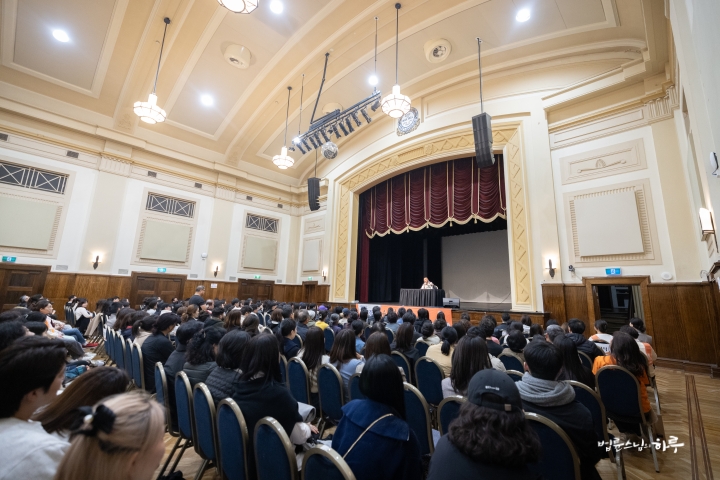
Then, Sunim began dialogues with those who had requested questions in advance. Today, 12 people asked Sunim questions. One of them sought Sunim’s advice about meeting a single father in his forties with three children who didn’t want to have more children, asking what she should do.
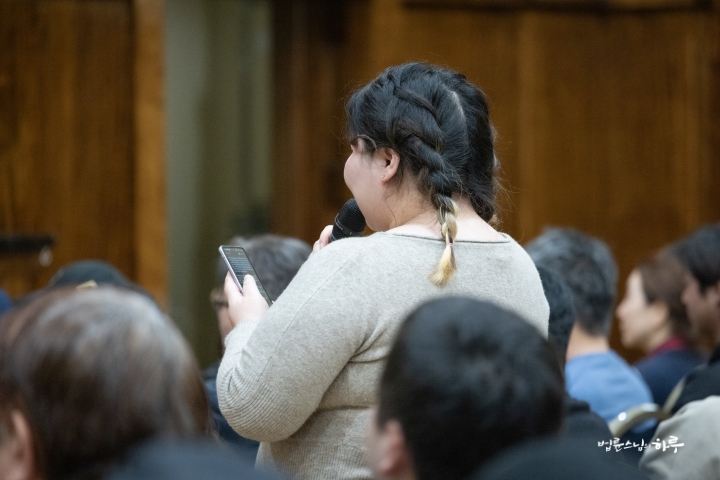
I Want to Have a Baby, but My Potential Partner Already Has Three Children. What Should I Do?
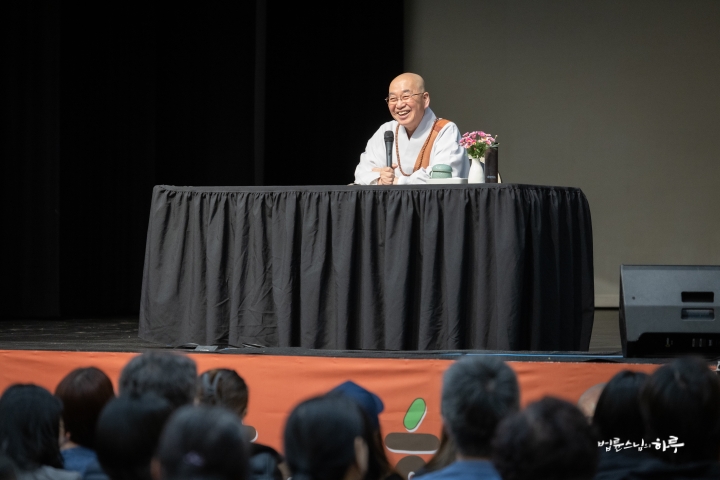
Raising a newborn baby requires a lot of energy, so wouldn’t it be wiser to accept three already grown children as your own? What do you think? If it were me, I’d marry a grandmother instead of a young woman. Then I’d have grandchildren all at once. (Everyone laughs) When you marry, those three children become your children, so why go through the trouble of having and raising a baby?
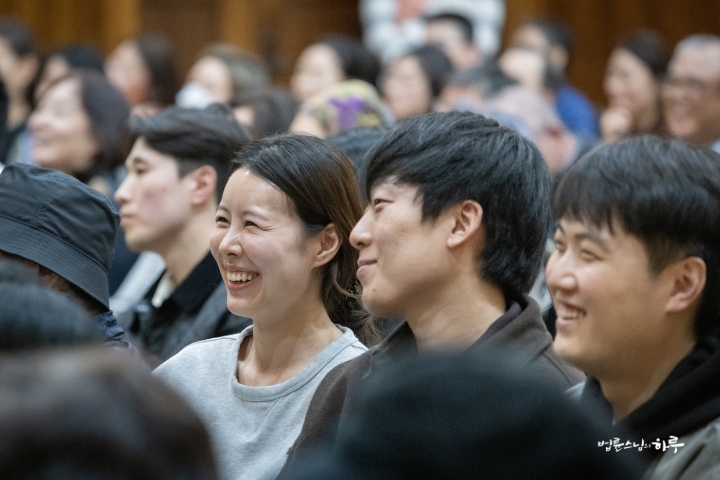
Your desire to have your own child now is somewhat selfish and unwise. If you want to marry this man, even if he suggests having a child, you should say, ‘You already have three children, why have more? Let’s focus on raising the children we have well!’ This approach would deepen your love. You’re free to have a baby, but you need to change your perspective.
If you really want to have a baby, you could live together and, without discussing it with the man, find an opportune moment to have a baby discreetly. What could the man do then? Why discuss it? While men can’t control having babies, if a woman wants to have a baby, she can find a way to do so. If the man raises an issue, you can just say, ‘We were careful, but it happened!’ (Everyone laughs)”
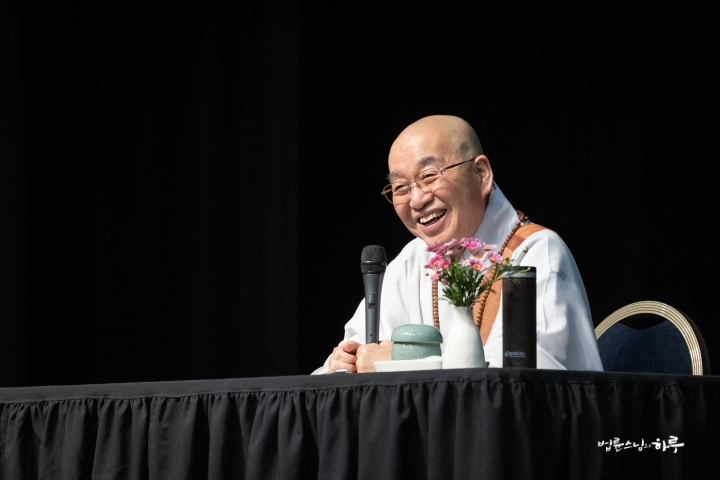
“I understand. I’m living alone in Australia, and after ending a 10-year relationship with my ex-boyfriend, I feel lonely living alone in this vast land. How can a woman living alone abroad overcome loneliness and become independent?”
“Then move to Fiji, an island country northeast of New Zealand. It’s a smaller land, so you won’t feel lonely there. But what does the size of the land have to do with feeling lonely? (Laughs)
“Sometimes I feel scared living alone abroad.”
“Then you can go back to Korea.”
“Yes, I could do that.”
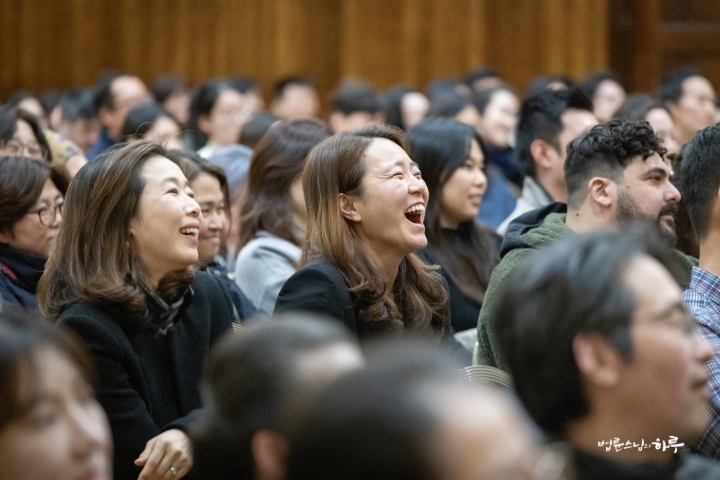
“Since you can go back to Korea if needed, you shouldn’t try to have everything while living abroad. Wanting to be a monk, get married, raise children – these are all desires. When you move abroad, shouldn’t you give up the desire to be part of the majority? As an immigrant, you can’t be part of the racial or linguistic majority. You have to accept being a minority. If you don’t like being a minority, you can go back to Korea. There, you automatically become part of the majority, so why keep coming abroad and complaining about being treated as a minority? If there’s a real violation of human rights because you’re a minority, you should raise the issue. For example, if you’re denied a job or entry to a restaurant because you’re a minority, you should protest and seek improvement within the bounds of the law. However, cultural issues are something you have to accept.
Also, if you marry a man with three children and feel jealous when he’s happy about his children, you shouldn’t get into such a marriage in the first place. If you feel bad or suspicious when you see him meeting and eating with the children’s mother, you shouldn’t marry him. Don’t you think a father of three should maintain a good relationship with the children’s mother for the sake of the children?”
“Yes, he gets along very well with the children’s mother.”
“If you’re jealous of him getting along well with the children’s mother, you shouldn’t get married. Also, you’ve been in a relationship for 10 years, which is practically a marriage without the legal registration. Why are you talking as if this is your first marriage? You’re being very self-centered in your perspective. You should think, ‘I’m remarrying too. I was in a marriage-like relationship for 10 years, but without children.’ (Laughs)
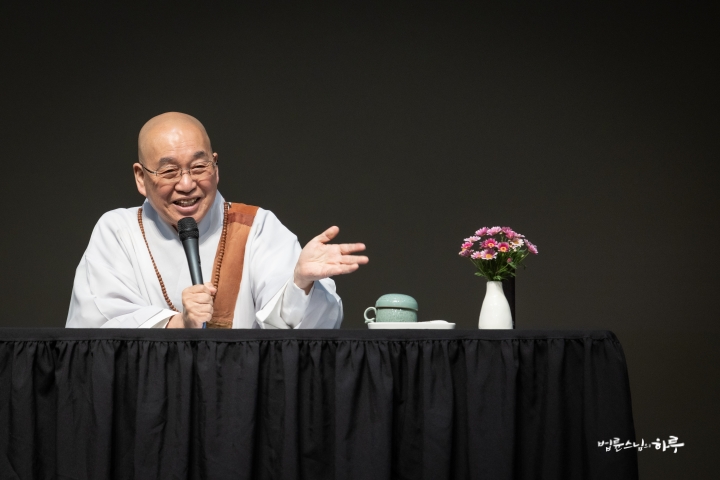
Having a newborn baby now would be a burden for both that man and you. It’s easiest to just accept someone else’s children as your own. Anyway, when they turn 20, you’ll have to send them all out of the house. These are children who will have to leave home soon. So it seems you don’t need to worry too much about it.”
“I think what you’re saying is right. Thank you.”
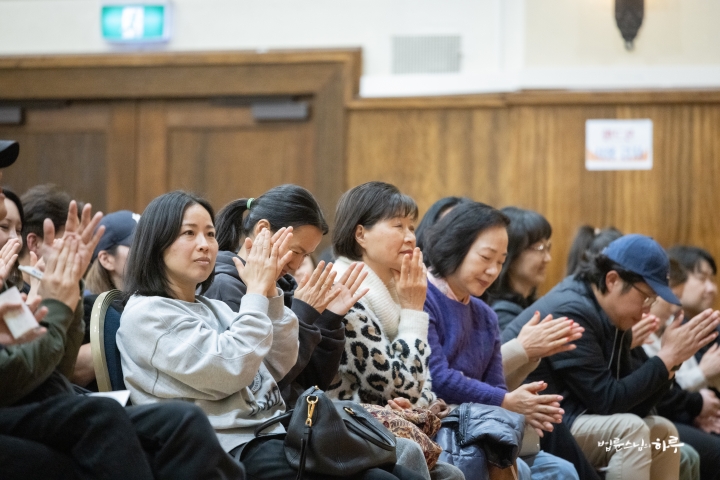
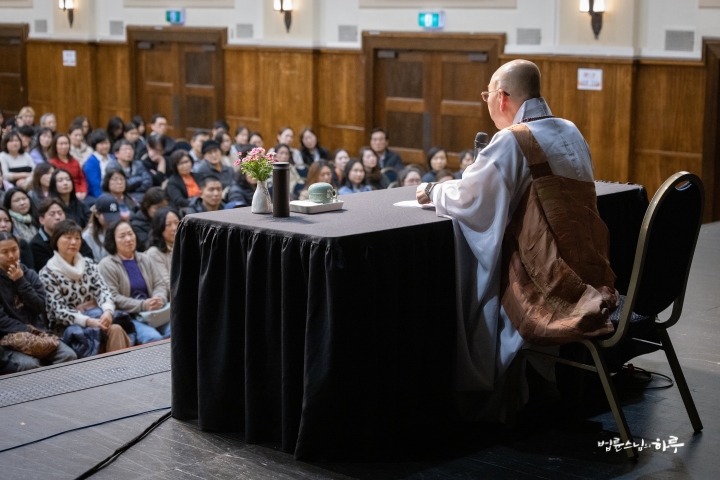
The questions continued to pour in. When asked if there were more people who wanted to ask questions on the spot, several raised their hands.
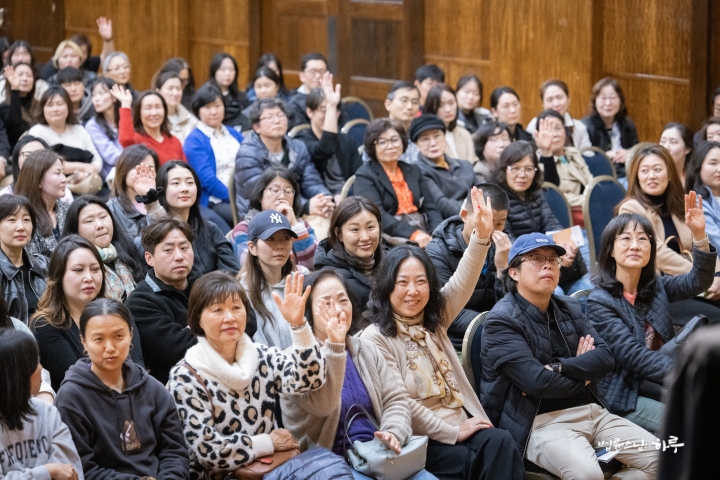
• When I encounter problems in life that I can’t solve, I get angry. Among various pieces of advice, which one should I follow?
• I’m pregnant, but memories of being abused by my mother keep coming back. Can I become a good mother too?
• When betrayed by people I trusted, it’s difficult to open my heart. Can I regain peace of mind by lowering my expectations of people?
• I’ve been in Australia for over 20 years, and I’m distressed by the thought that I might not be able to be with my parents in their final moments.
• I’ve been living separately from my wife since the COVID-19 period, and I’m wondering if I should reunite and fulfill my role as the head of the family.
• I run a business, and competing companies are demanding unfair price collusion. How should I overcome this situation?
• Although I’m practicing, it’s difficult to eliminate karmic habits. The environment has a big impact on practice. I’m curious about methods to eliminate karmic habits.
• A dear friend of mine has the same concerns as me. I received great comfort from Sunim, but my friend has a different religion, so I’m hesitant to recommend Sunim’s words.
• What is the ‘true self,’ and what is the ‘ego’? I’m curious about how to distinguish between the two.
• My 4-year-old child has decision-making difficulties, making it hard to raise them. I struggle between trusting the child and giving them autonomy.
Today, Sunim received many questions. The dialogue ended after more than two hours since the lecture began.
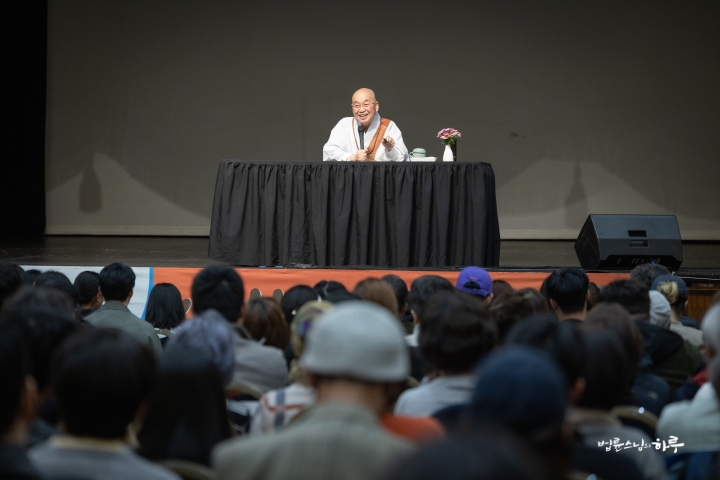
“Did you enjoy it?”
“Yes!”
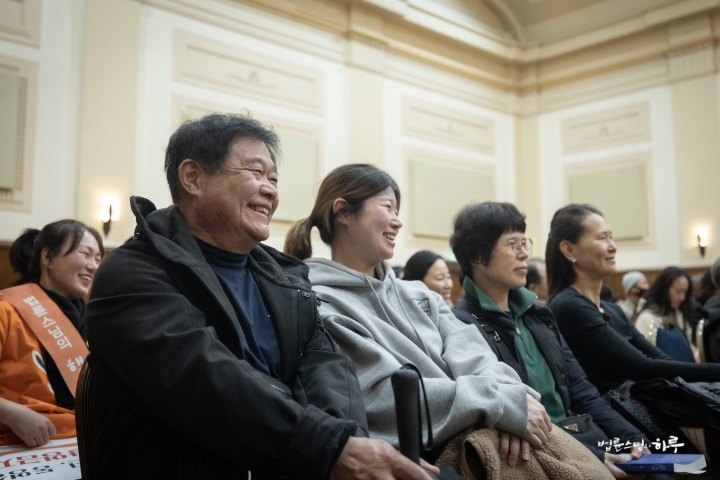
“As we talked, it ended up being 2 hours and 10 minutes. I’ll come again next time to have a conversation with you all.”
The lecture concluded with a big round of applause and a promise for next time.
Immediately after, a book signing session was held in the city hall lobby. Many audience members lined up and waited for their turn.
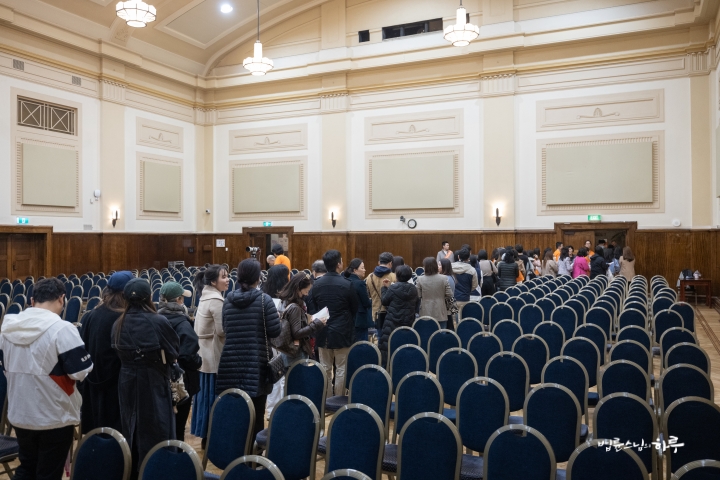
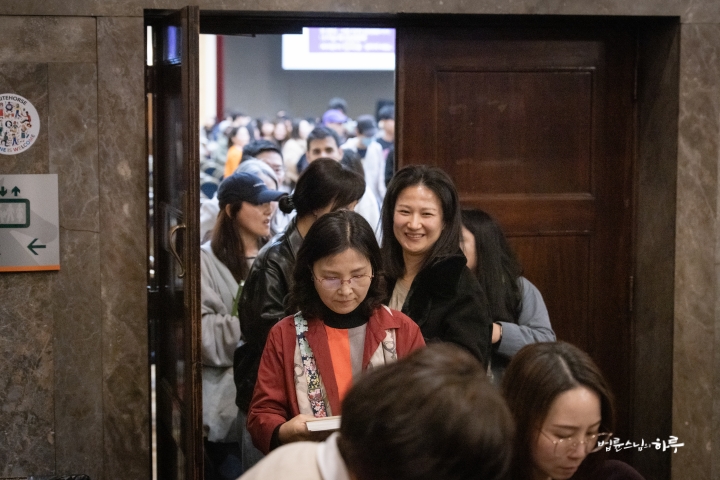
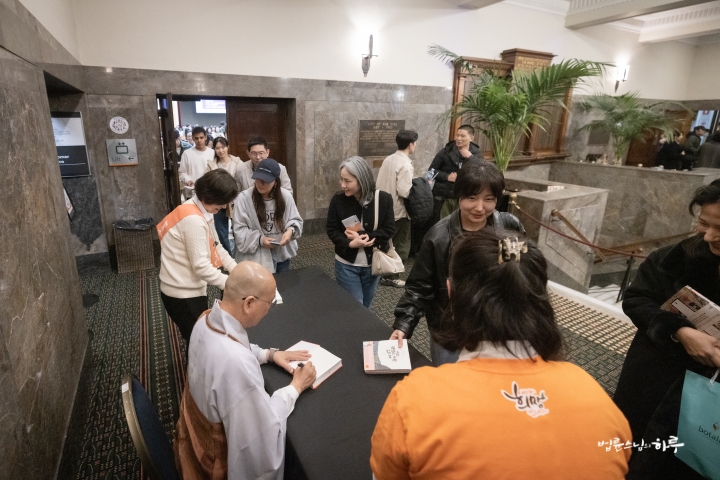
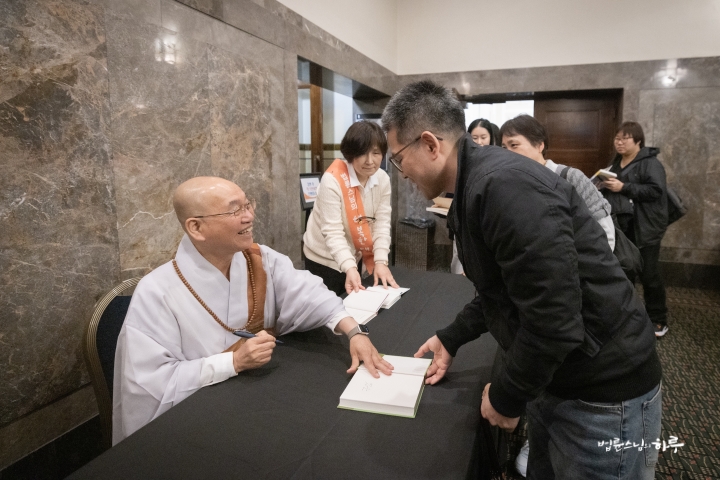
Many people greeted Sunim, saying they received a lot of help by watching his Dharma Q&A during difficult times.
“Thank you, Sunim. Please stay healthy for a long time.”
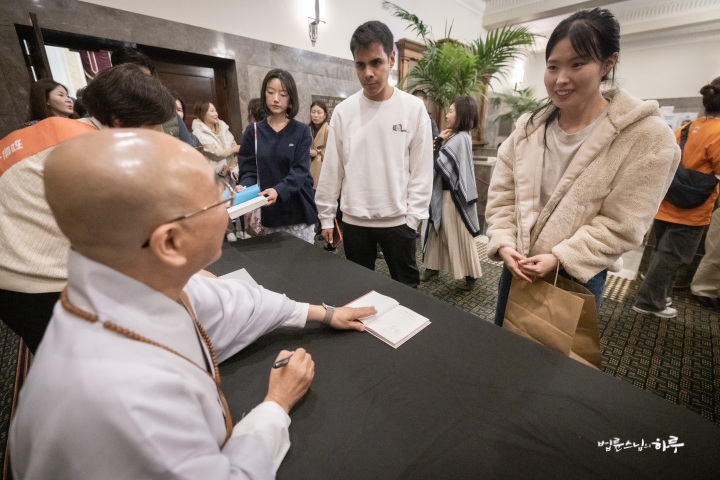
After the book signing, Sunim took a commemorative photo with the volunteers who prepared for the lecture on stage.
“Melbourne!”
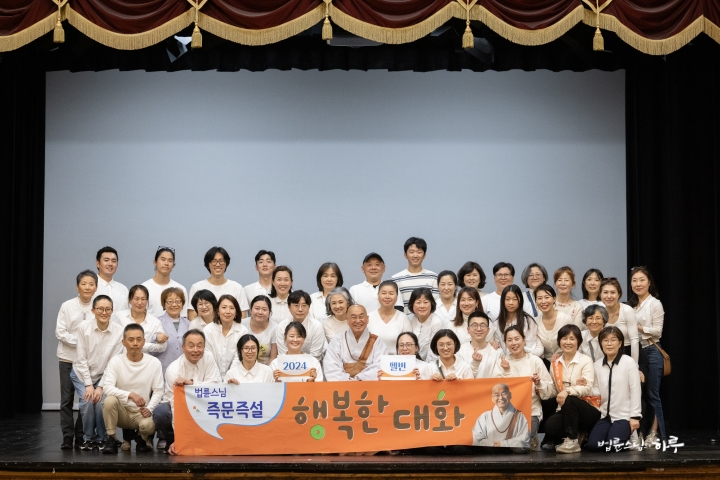
Then, all the volunteers sat in the empty auditorium and had a conversation with Sunim. Sunim said with a smile:
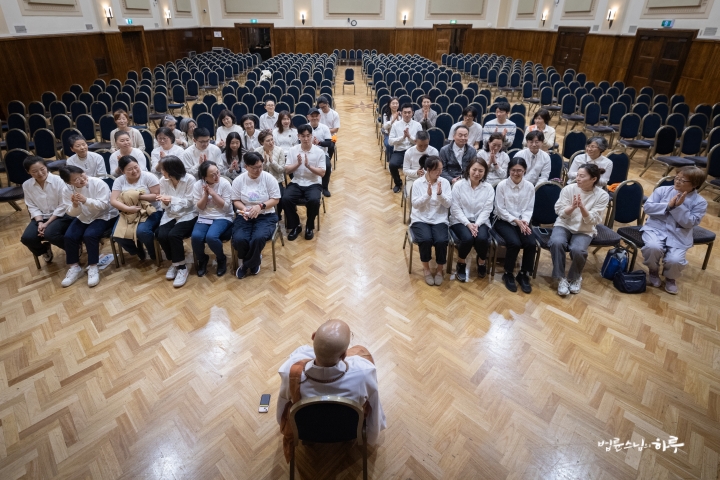
“Have you all been well? We should at least know who volunteered before we leave. Please introduce yourselves with your name, occupation, and what activities you do in Jungto Society.”
One by one, they took the microphone and briefly introduced themselves. After each introduction, everyone applauded vigorously.
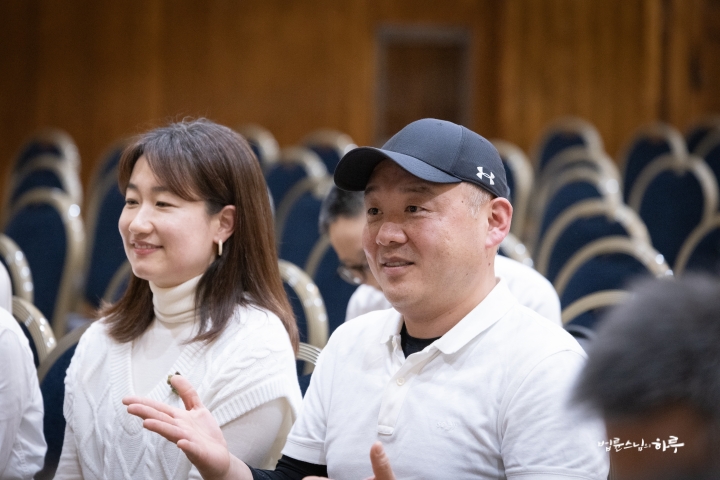
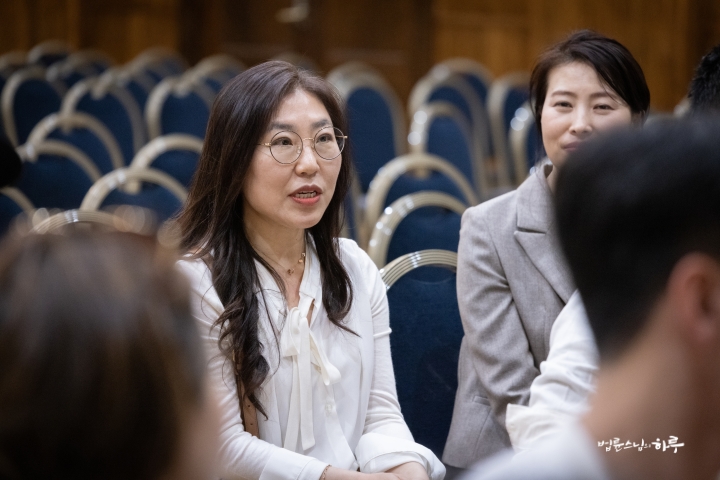
There were several people who came to volunteer even though they weren’t Jungto Society members, and there was also a son who came to volunteer with his mother.
After listening attentively to the introductions and impressions, Sunim said:
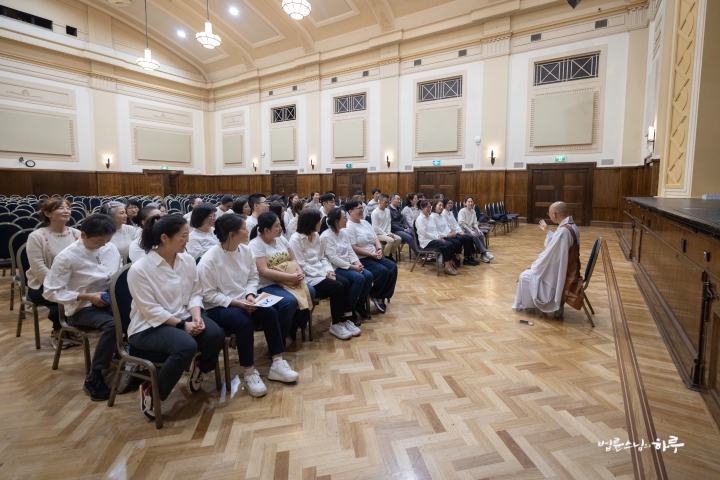
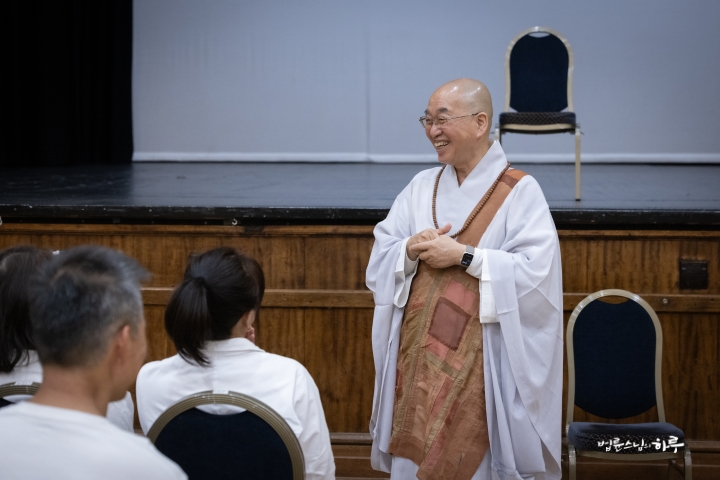
“Thank you all. The reason I asked you to introduce your occupations was to see if there was anyone who could volunteer in Bhutan. We were looking for a dental technician, and fortunately, there is one here. Let’s take a month off each year to volunteer. Not just in Bhutan, but various volunteers are needed all over the world. Everyone, retire quickly and come volunteer.” (Laughter)
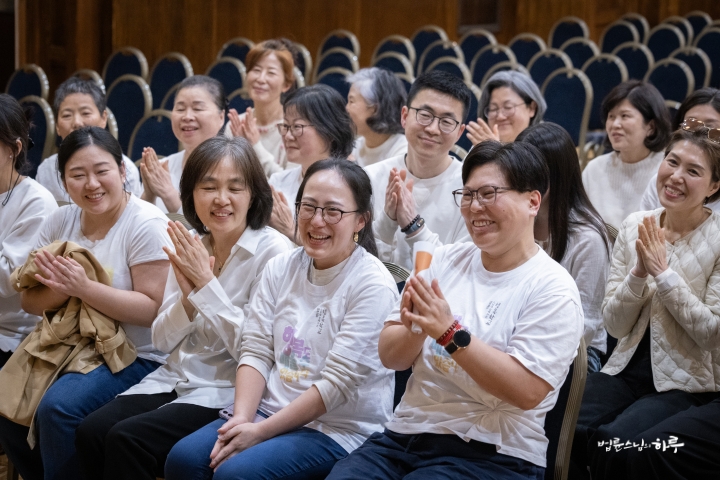
Sunim greeted the volunteers and left the lecture hall.
“I’ll go ahead first. Please have a heart-to-heart talk with the Dharma teacher.”
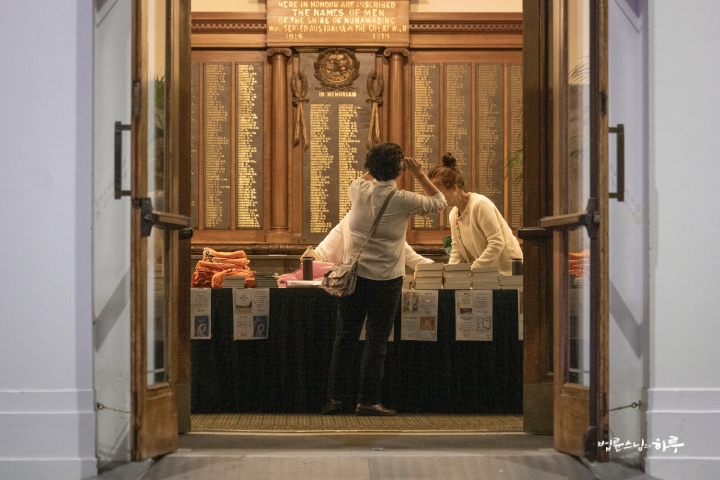
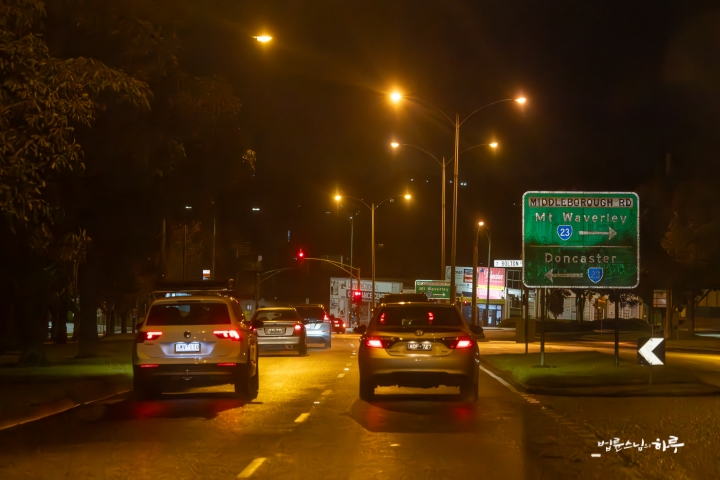
The volunteers had a heart-to-heart talk with Dharma Teacher Myodeok, while Sunim arrived at his accommodation and recorded a Dharma talk to be released at next week’s Weekly Dharma Assembly. The next Weekly Dharma Assembly time coincides with his flight time, so he can’t do a live broadcast. Therefore, he decided to record in advance and send the video to Korea.
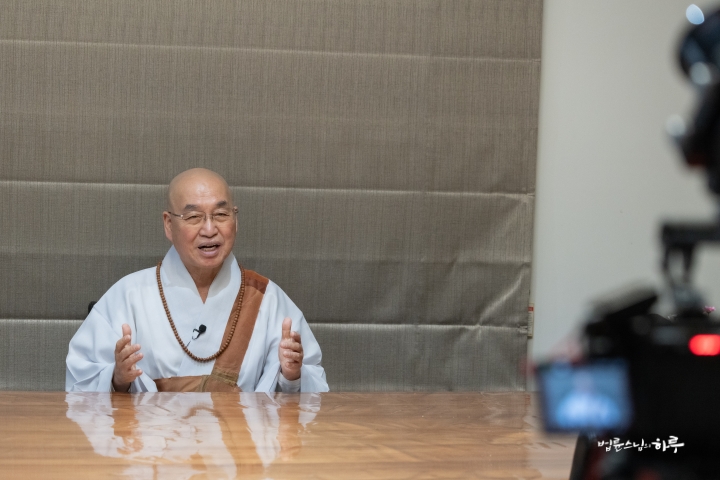
After finishing the video recording, Sunim had a late dinner, then worked on manuscript proofreading and other tasks before going to bed.
Tomorrow, in the morning, he will move from Melbourne Airport to Perth Airport. In the afternoon, he will give a lecture in English for foreigners, and in the evening, he will hold a Dharma Q&A session for Korean expatriates.




